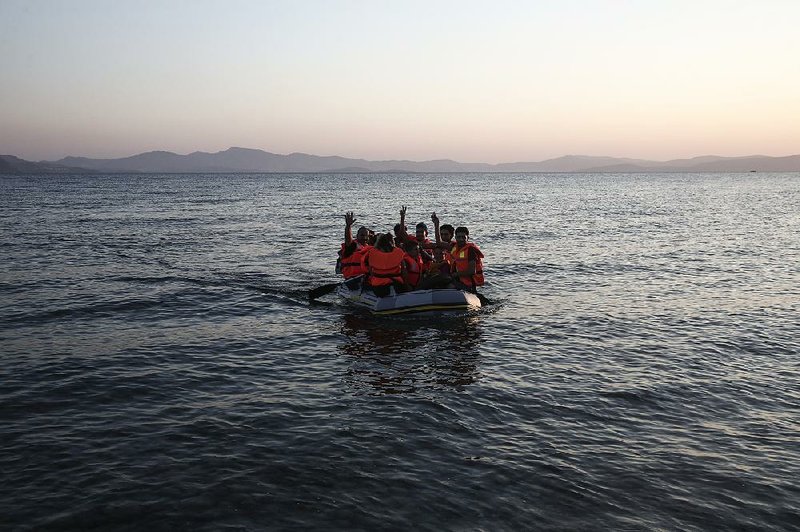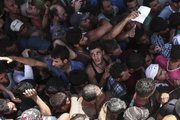KOS, Greece -- Locked in a sunbaked sports stadium without food, drinking water or sanitation, about 1,000 refugees lined up for hours Wednesday to register with Greek authorities on the island of Kos, which is now at the forefront of a humanitarian crisis sweeping the financially broken country.
After sending police reinforcements, the government promised to charter a commercial ship to house up to 2,500 people on the island where authorities have been overwhelmed by a spike in arrivals.
Alekos Flambouraris, an aide to the prime minister, said the vessel would be used to provide shelter and check documents. More details of the plan were to be announced today, his office said.
The order to charter the ship was given after violence broke out in front of a police station on the holiday island, where foreigners were lining up to receive temporary residence documents. The stadium is currently being used to provide shelter for about 1,000 people.
Greece has become the main gateway to Europe for tens of thousands of refugees and other foreigners, mainly Syrians fleeing war, as fighting in Libya has made the alternative route from North Africa to Italy increasingly dangerous. Nearly 130,000 people have arrived since January on the eastern Aegean Sea islands from nearby Turkey -- a 750 percent increase over last year.
Kos Mayor Giorgos Kyritsis welcomed the promised ship, but complained that the radical left-led government did little to help his island until Flambouraris stepped in.
"The government was asleep," he told private Skai TV on Wednesday. "How come [now] we can talk normally with one minister?"
Tourism-reliant Kos, which received 7,000 migrants last month and has seen tourist arrivals drop by about 7 percent this year, is a stark study in contrasts.
Boatloads of refugees arrive in the rosy hues of dawn -- as the last revelers are straggling out of night clubs and joggers run along the seafront.
Mega yachts and cruise ships anchor just off the detention center, refugees sleep on bicycle lanes forcing cycling tourists to swerve, and bikini-clad visitors stroll along next to a man in a traditional Iraqi dress.
Scores of Syrians landed early Wednesday, crossing the 2.5-mile strait from Turkey in rubber boats -- which, in many cases, local men rush to carry away for their own use.
The refugees don't want to stay in Greece. Their destinations are wealthy countries such as Germany or the Netherlands, and all they seek from Greece is temporary travel papers to continue their trek through the Balkans and central Europe, through countries like Hungary, where the government is building a fence along the border with Serbia.
Inside the stadium, three police clerks were struggling to register hundreds of refugees, and for the second day used fire-extinguishers to control the jostling crowd. An estimated 300 travel documents were handed out by early afternoon since the morning.
The office on Kos for Doctors Without Borders strongly deplored the conditions in the stadium, where most refugees were sent after being evicted from makeshift camps all across the town.
"What we see now is a completely disproportionate focus on security management of these people without the relative humanitarian assistance that they need," said Vangelis Orfanoudakis from the charity.
"There are just two toilets. No access to water. They now have put a water hose for all the people, the situation is really dramatic," he said.
Municipal officials weren't available to comment Wednesday, but have long been lobbying for the refugees to be taken to mainland Greece. Mayor Kyritsis has pledged to get them off parks and public areas.
"The situation here is very bad and police here they beat a boy, they beat a man, they beat children. It's too bad," Syrian refugee Laith Saleh, who is in the stadium, said by phone Wednesday. "We can't go out."
A group of young Syrian men from Latakia, who had just arrived in the morning after an Italian coast guard vessel from a European border watch mission picked up their boat in the sea, rested on a pavement behind the stadium and planned their next moves. Across the road, an elderly Greek couple handed out food to refugees perched on the wall.
"The people are not informed about the procedure," Orfanoudakis said. "They need to have access to health care, food, water, basic sanitation ... together with protection for their legal rights, something which is not happening at all here in Kos."
Meanwhile, the mayor of a Hungarian village at one end of the border fence on Wednesday said migrants will just try to circumvent the barrier and called the project a ploy by the government to win votes from the far-right Jobbik party.
Robert Molnar said that, while migration was a serious problem for Europe, migrants needed to be treated with empathy.
"Mercy, leniency and humanity are missing from today's Hungarian system, to consider these people as people," Molnar, a former lawmaker, said in an interview at the border.
More than 110,000 migrants have filed for asylum in Hungary this year, compared with fewer than than 43,000 in 2014.
The fence is made up of three strands of razor wire near ground level. But by the end of August it is to be 13 feet high and extend along the whole 109-mile border between Serbia and Hungary.
Information for this article was contributed by Oleg Cetinic and Derek Gatopoulos of The Associated Press.
A Section on 08/13/2015



